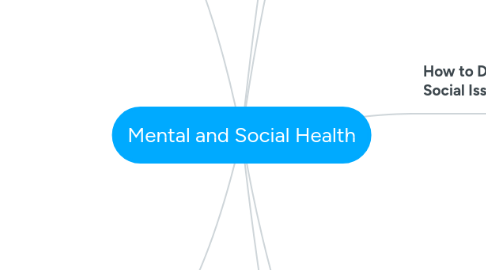
1. What is Health
1.1. "a state of complete physical, social and mental well-being and not merely the absence of disease or infirmity." - WHO, World Health Organisation
2. Types of Health
2.1. Mental Health
2.1.1. -individual realises their own abilities
2.1.2. - can cope with stress of life
2.1.3. - can work productively and fruitfully
2.2. Social Health
2.2.1. - ability to form meaningful relationships
2.2.2. - interact in health positive ways
2.3. Physical Health
2.3.1. - well-being of the body
3. How to Deal with Mental or Social Issues
3.1. 1. Know yourself
3.1.1. Accept who you are
3.1.2. Be optimistic
3.1.3. Don't be critical of yourself
3.2. 2. Be able to recognise there is a problem
3.2.1. Find positive coping strategies
3.2.2. Get help
3.3. 3. Work on developing positive, close relationships
3.3.1. E.g. Calling friends
3.3.2. E.g. Going out with family
3.4. 4. Give to others
3.4.1. Makes you feel needed and valued
3.5. 5. Set tasks to achieve things
3.5.1. Planning also reduces stress
3.6. 6. Have some 'me' time
3.7. 7. Be physically active
3.7.1. Energise you and lift your mood
3.7.2. Reduces stress or anxiety levels
3.8. 8. Eat a balanced, healthy diet
3.8.1. Healthy weight
3.8.2. Balance of nutrients - body functions well
3.9. 9. Get quality sleep
3.10. 10. Control unhealthy ways of coping
3.10.1. They have -ve long term effects
4. Solutions for a Mental Health Issue
4.1. Self-help Strategies
4.2. Talking Therapies
4.2.1. Cognitive Behavioural Therapy (CBT)
4.2.2. Mindfulness
4.2.3. Therapy
4.3. Medication
4.3.1. Anti-depressants
4.3.1.1. Boost brain chemicals that affect mood
5. Benefits of a good Mental Health
5.1. Having coping skills for life's challenges
5.2. Resilience
5.3. The ability to function well with others
5.4. Effective management of emotions
5.5. An honest self-regard and self-esteem
5.6. The ability to view the world honestly, accurately and realistically
6. Consequences of Neglecting Mental and Social Well-being
6.1. Decreased Motivation
6.2. Difficulty dealing with trauma and Challenges
6.3. Poor physical health
6.3.1. Sometimes as a result of medication
6.3.2. Mental and social health issue can make it hard to eat well or exercise
6.3.3. Sleep
6.3.3.1. Poor mood, lack or motivation, stress or fatigue may make some people sleep or remain in bed longer than usual
6.3.3.2. Difficulty sleeping due to anxiety
6.4. High amounts of stress
6.4.1. Headaches, chest and back pains
6.4.2. Sleeping problems and lack of energy
6.4.3. Dizziness, shallow breathing or rapid heart rate
6.5. Sedentary lifestyle
6.5.1. CHD, diabetes, bowel cancer, osteoporosis or loss of muscle (atrophy)
6.6. Poor nutritional intake
6.6.1. Bulimia nervosa, anorexia nervosa or obesity
7. Negative Coping Skills
7.1. Work
7.2. Denial
7.3. Avoiding Problems
7.4. Alcohol
7.4.1. Disrupts sleep
7.4.2. Hangover - difficulty concentrating
7.4.3. Worsens feelings of anxiety or depression
7.4.4. Expensive - financial stuggles
7.4.5. Effect of physical health + addictive
7.5. Smoking Tobacco
7.5.1. Stimulant - doesn't help relax
7.5.2. Stress - e.g in no smoking area
7.5.3. Expensive - financial stuggles
7.5.4. Negative impact on lungs + addictive
7.6. Drugs
7.6.1. Unpredictable effects
7.6.2. React against alcohol and lead to overdose
7.6.3. Stimulants + sedatives mixed put the body under immense pressure
7.6.3.1. Coma
7.6.3.2. Cardiac Arrest
7.6.3.3. Death
7.6.4. Expensive + addictive - financial struggles
